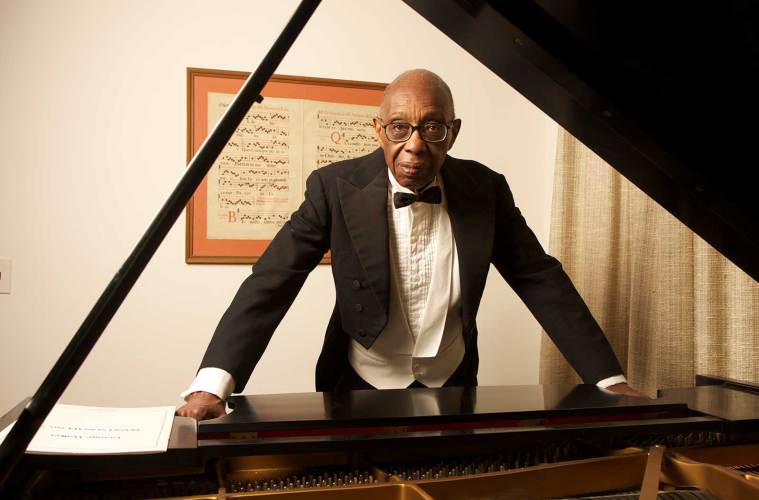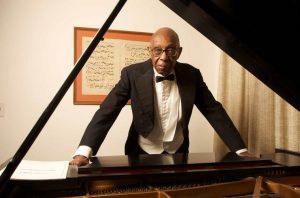
George Theophilus Walker (born June 27, 1922) is an African-American composer, the first to win the Pulitzer Prize for Music. He received the Pulitzer for his work Lilacs in 1996.
Walker is the father of two sons, violinist and composer Gregory T.S. Walker, and playwright Ian Walker.
George Theophilus Walker was born in Washington, D.C. on June 27, 1922. His father emigrated from Kingston, Jamaica to the United States where he became a physician after graduating from Temple University School of Medicine. Walker’s mother, Rosa King, supervised her son’s first piano lessons when he was five years old. His first teacher was Miss Mary L. Henry. Mrs. Lillian Mitchell Allen, who had earned a doctorate in music education, became his second piano teacher. Before graduating Dunbar High School, George Walker was presented in his first public recital at age 14 at Howard University’s Andrew Rankin Memorial Chapel.
He was admitted to the Oberlin Conservatory that same year, where he studied piano with David Moyer and organ with Arthur Poister. In 1939, he became the organist for the Graduate School of Theology of Oberlin College. Graduating at 18 from Oberlin College with the highest honors in his Conservatory class, he was admitted to the Curtis Institute of Music to study piano with Rudolf Serkin, chamber music with William Primrose and Gregor Piatigorsky, and composition with Rosario Scalero, teacher of Samuel Barber. He graduated from the Curtis Institute with Artist Diplomas in piano and composition in 1945, becoming one of the first black graduates of the music school.
Walker was presented in a debut recital in Manhattan’s Town Hall. With this “notable” debut, as it was described by The New York Times, he became the first black instrumentalist to perform in that hall. Over the course of the next five decades, he balanced a career as a concert pianist, teacher, and composer. Two weeks after his New York debut, he performed Rachmaninoff’s 3rd Piano Concerto with the Philadelphia Orchestra conducted by Eugene Ormandy as the winner of the Philadelphia Youth Auditions.
He was the first black instrumentalist to appear with this orchestra. The following year, he played Brahms’ 2nd Piano Concerto with the Baltimore Symphony, Reginald Stewart conducting, and the 4th Beethoven Concerto with Dean Dixon and his orchestra. In 1950, Walker became the first black instrumentalist to be signed by a major management, the National Concert Artists. In 1954, he toured seven European countries, playing in the major cities of Stockholm, Copenhagen, The Hague, Amsterdam, Frankfurt a Main, Lausanne, Berne, Milan and London.
Upon returning to the United States, he taught at Dillard University in New Orleans, Louisiana for one year before entering the Doctor of Musical Arts degree program at the University of Rochester’s Eastman School of Music in 1955. In 1956, he became the first black recipient of a doctoral degree from that institution as well as the recipient of a second Artist Diploma in piano.
George Walker was awarded both a Fulbright Fellowship and a John Hay Whitney Fellowship in 1957. He spent the next two years in Paris studying composition with Nadia Boulanger. In 1959, he embarked upon another international tour, playing concerts in France, Holland and Italy. After a recital in London’s Wigmore Hall in 1963 sponsored by Mrs. Zimbalist, he received an honorary membership in the Frederic Chopin Society there.
Walker’s distinguished academic career continued in 1960 with faculty appointments to the Dalcroze School of Music; the New School for Social Research, where he introduced a course in aesthetics; Smith College (1961–68), where he became the first tenured black faculty member; the University of Colorado Boulder (1968–69) as visiting professor; Rutgers University (1969–92), where he served as chairman of the music department for several years; the Peabody Institute of Johns Hopkins University (1975–78); and the University of Delaware (1975–76), where he was the recipient of the first minority chair established by the University.
He has given master classes in numerous institutions, including the Curtis Institute of Music, the Oberlin Conservatory of Music, the University of Colorado Boulder, Columbia University, Wayne State University, Wellesley College, Temple University, Washington University in St. Louis, Williams College and Montclair State University.
In 1946, Walker composed his String Quartet no. 1. A string orchestra arrangement of the second movement of that work received its world premiere in a radio broadcast that was conducted by pianist Seymour Lipkin. Originally titled Lament, Walker later changed the title to Lyric for Strings. It is now one of the most frequently performed orchestral works by a living American composer. His subsequent body of work included over 90 works for orchestra, chamber orchestra, piano, strings, voice, organ, clarinet, guitar, brass, woodwinds, and chorus.
In 1996, Walker became the first black composer to receive the coveted Pulitzer Prize In Music for his work, Lilacs for Voice and Orchestra, premiered by the Boston Symphony, Seiji Ozawa conducting. Washington, D.C. Mayor Marion Barry proclaimed June 17, 1997 as “George Walker Day”. in the nation’s capitol.
In 1998, he received the Composers Award from the Lancaster Symphony and the letter of Distinction from the American Music Center for “his significant contributions to the field of contemporary American Music.” He was elected to the American Academy of Arts and Letters in 1999. The following year, George Walker was inducted into the American Classical Music Hall of Fame.
Over the next several years, he received numerous awards including the Dorothy Maynor Outstanding Arts Citizen Award (2000), Classical Roots Award from the Detroit Symphony (2001), the A.I. Dupont Award from the Delaware Symphony (2002) the Washington Music Hall of Fame (2002), and the Aaron Copland ASCAP Award (2012). He is the recipient of two Guggenheim Fellowships, two Rockefeller Fellowships, a Fromm Foundation commission, two Koussevitsky Awards, and an American Academy of Arts and Letters Award, as well as honorary doctorate degrees from Lafayette College (1982), Oberlin College (1983), Bloomfield College (1996), Montclair State University(1997), Curtis Institute of Music (1997), Spelman College (2001), and the Eastman School of Music where he gave the Commencement Address (2012).
His autobiography, “Reminiscences of an American Composer and Pianist”, was released in 2009 by Scarecrow Press.

